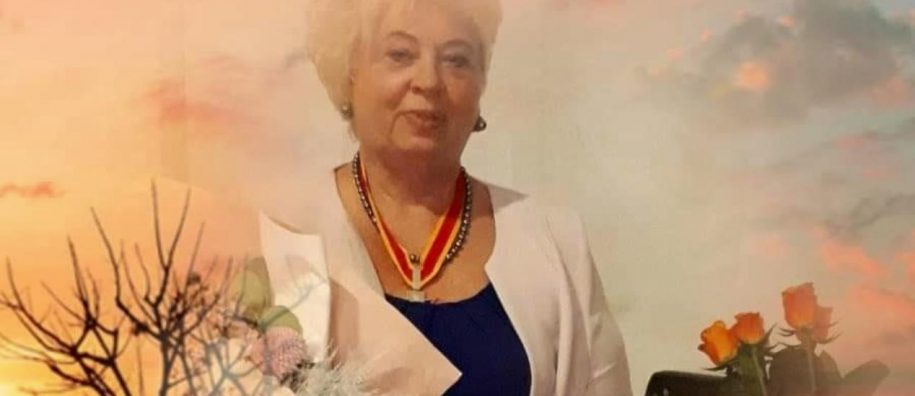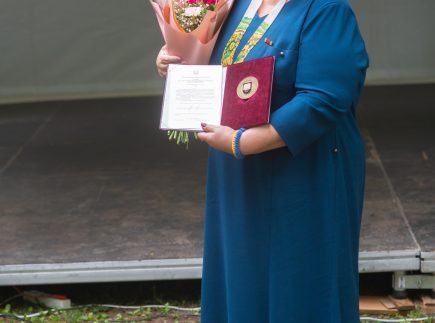
On the 10th of May, Dr. Žaneta Simanavičienė, a professor at the Public Security Academy at Mykolas Romeris University (MRU), gave an interview to the daily “Lietuvos Rytas” about her experiences in helping Ukrainian children and students flee from the War. This text is a translation of the “Lietuvos Rytas” article.
Prof. Simanavičienė’s idea to rescue Ukrainian children from the Russian occupiers’ invasion of Ukraine by writing her Lithuanian phone number on their bodies, is a reminder of the times when Nazis invaded Lithuania. Then Jews, saving their children from the ghettos, also wrote names or other signs on their children’s bodies.
“When I think back to the first day of the War in Ukraine, I still get sick to my stomach,” says Professor Simanavičienė. “I learned the terrible news from the press on the morning of Feb. 24th because I have a habit of reviewing the latest Lithuanian and world news each morning. When I realized that the worst predictions about the War in Ukraine were coming true, I immediately rushed to my computer and created a friends’ group “Slava Ukraini” in the social messaging network “Viber,” which was joined by as many as 33 colleagues from the Ukrainian universities. On Feb. 27th we started receiving information about the happenings in Ukraine, and I likewise shared the news from Lithuania, because not all colleagues had access to the media at that time. I would cry when writing on “Viber” several times a day,” she said. “In addition, Ukrainians really wanted to know who could help or shelter them if they fled their homeland,” the professor added.
– Before the War did you often visit Ukraine?
– Yes, often. The last time I visited Ukraine was in September of last year. I was in Mariupol. I admired the beautiful roses in the streets and squares of the city and enjoyed the Ukrainian cuisine. My colleagues took me to the so-called grey zone, which had been occupied by unsavory characters. From time to time occasional shootings would happen there. Mariupol was an extremely beautiful city and there are no words to describe the sincerity of its people! It is horrific to hear that Mariupol has been wiped off the face of the earth and that it is simply gone.
– What did Ukrainians ask you in your correspondence?
– The most terrifying were the requests by several colleagues, who said “If something happens to us, please, just rescue our children.” It was then that I couldn’t sleep at night trying to come up with a way to rescue not only the children of my colleagues, but also other Ukrainian children. I offered to have them write my phone number on the children’s bodies and figure out a way to take them to the Ukrainian-Polish border. I planned to go pick up those children and bring them to Lithuania. I believed that someone would have definitely called upon seeing a Lithuanian phone number on their bodies, thus I would have known how many and where the children are.
– Did you have to put such a sad plan into action?
– Thank goodness, no. Ukrainian colleagues and their children managed to escape from a burning Mariupol, which was constantly bombarded by the Russians, and other places. Among those refugees two are my doctoral students – one of them found asylum in Germany and the other – in Lithuania. A friend’s husband was fighting in “Azovstal” factory, in Mariupol. He was taken prisoner. At first, the Russian occupiers allowed him to call home once a week in exchange for money, but then the connection was lost. Now, my friend has no news about her husband for many months, but is still waiting for him to be exchanged in a prisoners’ swap. Unfortunately, not many soldiers of the “Azov” regiment return home to Ukraine during such exchanges.
– When it was no longer necessary to rescue Ukrainian children on the Ukraine-Polish border, you probably did not sit and do nothing. Did you have a chance to care for war refugees in Kaunas?
– Mykolas Romeris University has dormitories in Kaunas and Vilnius. University management decided that Ukrainians, who came to Kaunas, could be housed in the dormitory on Maironis Street. Therefore, my colleagues and I immediately got to work. We bought new bed linen and dishes and the representatives of the “Red Cross” brought various hygiene products, because the Ukrainians needed absolutely everything. After all, many Ukrainians fled Ukraine practically as they stand. Only some had a small suitcase.
I wrote a letter to Seimas member Kazimieras Starkevičius. He answered within ten minutes. Thanks to him, various fresh vegetables were delivered to the Ukrainians for four times, because at first, we could only distribute seven potatoes to each refugee.
The Kėdainiai Canning Factory sent a variety of canned vegetables, jams, and mayonnaise – practically everything that is produced there.
When we thought of organizing Easter festivities and celebration of St. Nicholas Day, the confectionery factory “Rūta” immediately responded to a request for sweets. There were 33 Ukrainian children in the dormitory under our care alone, but, we also invited children of other Ukrainians staying in Kaunas. More than 200 children showed up. There were enough sweets for everyone.
I had to do a lot of work helping Ukrainians entangled in bureaucratic matters. They needed to know how and where to get the financial support, how to open bank accounts, how to register for a doctor’s appointment, or what documents to submit to “Sodra.” I took them to the restaurants that offered free lunch, lectured a course on the Basics of Business, i. e. how to start an individual activity or open a business in Lithuania. With the colleagues we worked hard at the “Žalgiris Arena” event “Come for Ukrainian borscht, Support Ukraine.” The women's political club “Milda” and the non-governmental organization “Saulės Smiltys” helped the Ukrainians settle in Kaunas. MRU senior librarian Benita Sušinskaitė provided the children with Ukrainian books. In fact, we have provided books to more than two hundred children.
– How many Ukrainians stayed at the University dormitory in Kaunas and do they still live there?
– When the War started, we provided housing to about 70 war refugees – women with children and their elderly mothers. We also welcomed two cats and two dogs from Ukraine. The veterinary care that they needed was provided free of charge.
What surprised me the most was that some of the Ukrainians had jobs already on the second day after arriving in Kaunas. And they did it on their own. They walked down Laisvės Avenue and stopped at almost every shop or cafe asking if someone could hire them. In other words, they clung to life in Lithuania the hardest they could.
Currently, there are about 30 Ukrainians living in the dormitory. Despite the ongoing war, some decided to go back to Ukraine, and others, who are working and earning a living, managed to rent apartments.
– Are Ukrainian universities up and running now and do you maintain contact with them?
– We meet the colleagues from Ukraine in European cities, invite them to work at our University and offer opportunities to participate in projects for their benefit. Recently, I invited colleagues to take part in the “Guest Lecturer” project and two colleagues from Ukraine, quite by chance, won. They received 3,000 Euros each.
Now, I could be doing spring planting, but I don’t have time because the Research Council announced a project “Summer Practice” for students. Students from Ukraine can also participate; therefore, I am looking for lecturers who would agree to take part in this project. 15 students from 15 Ukrainian universities have already signed up. Project rules stipulate that it is one teacher-one student ratio. I am glad that colleagues from all over Lithuania responded to the invitation to join the project. We are currently coordinating topics for the practice.
– Do you have time for your personal life?
– Currently, I don’t know what it means to have a free weekend. Sometimes I tell myself that I need to stop and take a break. I have 3 granddaughters. I need to spend time with them too. One of my granddaughters lives in Iceland, but I have already visited her. In general, I really enjoy travelling, when I have the chance.
– Have you learned any Ukrainian?
– I think I could carry on a conversation. When my colleagues from Ukraine complain that they don’t have time to translate some texts from Ukrainian, I ask to send me texts in the Ukrainian language, and then I do the translation myself. At first, I apologized for writing letters in Russian, but now I am writing in Ukrainian. Of course, with the help from the online translator. Apparently, the war will “teach” me one more language.
– You are keeping up with the news from Ukraine. How long do you think this war will last?
– I don’t want to sadden anybody, but it appears to me that the war will not end soon because politicians, both from Lithuania and abroad, are “running away” from the problem. Until there is unity and understanding that this war in Ukraine, provoked by Russia, affects the whole Europe and the world, it will not end.
When I hear that some foreign country has given Ukraine 2 or 8 tanks, I start to laugh bitterly. After all, even Aleksotas (a region in Kaunas) where I live, could not be defended by two tanks.
– Does Lithuania need to prepare for war?
– Long ago I have put together an “emergency backpack” with the most important documents. If I had to, I would grab the backpack and walk out the front door. I take an example from a colleague who lived in Mariupol and whose husband on the 24th of February of last year told her to take an “emergency backpack,” their daughter, and leave Ukraine immediately. That is what she did. Unfortunately, her old father refused to leave Mariupol. He survived the worst of the Russian bombings. I wonder if we would be able to escape somewhere from Lithuania in the event of a war. Therefore, there is no need to panic and be distracted.
*The Senate of Mykolas Romeris University has declared 2023 Ukraine’s Year of Freedom. For the first time the Senate decided to award Senate Badges of Honor for Aid to Ukraine. Prof. Simanavičienė is the recipient of such a Badge of Honour.
(A translation from daily "Lietuvos Rytas" interview by Birutė Vyšniauskaitė, published on May 10th, 2023.)
